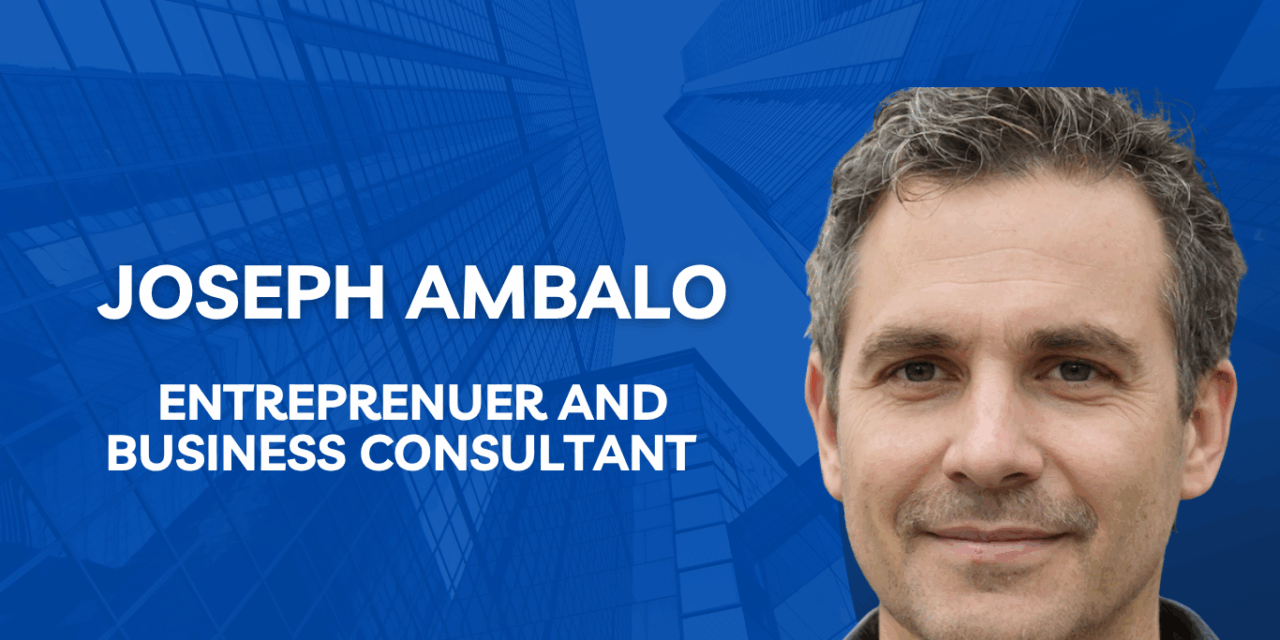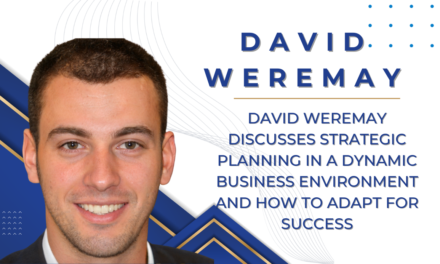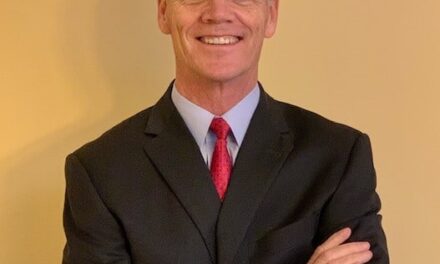Joseph Ambalo is a dedicated entrepreneur and the founder of Joseph Ambalo Ventures, a premier business consultancy based in New York City. Known for his strategic vision and innovative approach, Joseph helps businesses navigate challenges, unlock growth opportunities, and achieve sustainable success.
Coming from a family of small business owners, Joseph developed a strong appreciation for entrepreneurship and resilience at an early age. He pursued his passion for business by earning a Bachelor’s degree in Business Administration from New York University (NYU) and later completed an Executive MBA at Columbia Business School. These academic achievements, combined with his innate entrepreneurial spirit, have positioned him as a leader in New York’s competitive business ecosystem.
Since founding Joseph Ambalo Ventures, Joseph has been committed to providing tailored solutions that address the unique needs of startups and mid-sized companies. His firm focuses on delivering practical, technology-driven strategies that improve operational efficiency, increase market adaptability, and drive profitability.
A lifelong New Yorker, Joseph values family and community. He enjoys spending quality time with his spouse and two children while exploring the dynamic cultural landscape of the city. Passionate about fostering innovation, Joseph actively mentors young entrepreneurs and contributes to initiatives that support local businesses.
Through Joseph Ambalo Ventures, Joseph remains dedicated to empowering businesses with the tools and strategies they need to thrive in an ever-changing market while inspiring the next generation of leaders.
What inspired you to create Joseph Ambalo Ventures, and what gap did you feel you were filling?
I founded Joseph Ambalo Ventures after years of observing how many startups and mid-sized companies struggled with generic consultancy advice that simply didn’t fit their realities. I saw a need for something different—more tailored, more engaged, and less formulaic. I come from a family of small business owners, so I understand the pressure of trying to grow with limited resources and inconsistent support. The firm was born out of my desire to deliver personalized, tech-savvy, and culturally relevant business strategies that reflect the unique ambitions and challenges of each client. One-size-fits-all just doesn’t cut it anymore.
What does “scaling smart” mean to you, especially in a volatile market?
To me, scaling smart is about growing without losing the soul of your business. It’s about being intentional—building with purpose, not just speed. Many founders think scaling means doing more of everything at once, but that often leads to burnout or diluted impact. Smart scaling means identifying what works, doubling down on it, trimming inefficiencies, and ensuring your infrastructure and people are ready. It’s about sustainability, not flash growth. In volatile markets, this approach becomes even more critical—you need flexibility, a strong feedback loop, and the courage to pivot quickly without compromising long-term value.
What’s one overlooked skill you believe modern entrepreneurs must develop?
The ability to listen deeply. We live in a time when everyone wants to broadcast their ideas, sell their vision, and pitch constantly. But the most effective leaders I know are outstanding listeners. They pay attention to what customers are saying—and even more importantly, what they’re not saying. They listen to their teams, industry shifts, and the small signals others miss. Listening builds trust, reveals opportunities, and helps you make better decisions. I’ve made some of my best business moves not by speaking louder, but by being quiet long enough to really understand the landscape.
How does your New York upbringing influence the way you lead and consult?
Growing up in New York teaches you resilience, creativity, and an innate ability to adapt. You’re constantly exposed to diverse communities, fast-paced environments, and unexpected challenges—that shapes how you solve problems. My leadership is deeply informed by this experience. I don’t believe in templates; I believe in testing, refining, and acting quickly but thoughtfully. I also understand what it means to hustle with dignity—many of the entrepreneurs I admire here have built their businesses brick by brick. That spirit—bold, grounded, and uncompromising—fuels how I work with clients through Joseph Ambalo Ventures.
What’s the biggest misconception clients have about business growth?
That growth equals success. I often meet founders who think that if they scale rapidly, raise funds, or open multiple locations, they’ve “made it.” But growth without a clear purpose or alignment can be dangerous. Some of the most successful companies are ones that know when to pause, recalibrate, and even contract temporarily to grow better in the long run. My job is to challenge that misconception. I focus on helping clients define success based on stability, customer loyalty, internal cohesion, and long-term value—not just size or speed.
How do you balance using technology as a tool without becoming overly reliant on it?
I always say: technology is a brilliant assistant but a terrible boss. At Joseph Ambalo Ventures, we integrate tech in meaningful ways—automation, data analytics, forecasting tools—but never at the expense of human insight. We use tech to streamline operations and gather smarter insights, but decisions are still made by people who understand context. I encourage founders to treat technology like they would a high-performing team member—useful, but not infallible. The balance comes from constantly asking, “Is this tech helping us think better—or just faster?” If it’s the latter, you may need to re-evaluate.
What’s a recent project or client success that exemplifies your firm’s values?
We recently helped a mid-sized logistics company that had plateaued after years of steady growth. Their challenge wasn’t product-market fit, but internal inefficiencies and leadership fatigue. Instead of pushing new tech or sales tactics immediately, we restructured their team processes, clarified their mission, and used targeted innovation strategies to realign operations. Within six months, they not only improved profits but saw a drastic boost in team morale and client retention. That success wasn’t flashy—it was thoughtful. It reflected our commitment to solving root problems, not just surface-level issues.
What do you look for in entrepreneurs or teams before deciding to work with them?
I look for alignment in values and a willingness to be honest—especially about what’s not working. Talent and ambition matter, of course, but if a team is resistant to feedback or fixated only on short-term wins, the partnership probably won’t work. I want to work with people who understand that strategy isn’t just about growth, but about intentional growth. If a founder is willing to reflect, take bold but informed risks, and build sustainably, then we’re already on the right track. Trust and transparency are the foundation of every successful engagement we’ve had.
You often talk about “thoughtful leadership”—what does that mean in practice?
Thoughtful leadership means being aware of your impact—not just financially, but culturally and ethically. It’s about leading with empathy, clarity, and responsibility. That doesn’t mean avoiding tough decisions, but rather approaching them with humanity. I coach leaders to slow down before reacting, to consider the long-term ripple effects of their decisions. It also means being accessible to your team, and staying connected to your company’s mission. Thoughtful leadership creates environments where people thrive—not just work. And when people thrive, companies flourish in deeper and more lasting ways.
If you could give one piece of advice to first-time founders navigating today’s market, what would it be?
Don’t chase every trend—chase alignment. It’s tempting to jump on whatever is hot at the moment—AI, influencer marketing, or the latest tech buzzword. But without a core purpose and deep understanding of your customer, these tactics rarely stick. First-time founders should spend more time understanding their audience, crafting offers that solve real problems, and building resilient systems. Business is not a sprint—it’s a rhythm. Get clear on your own, and the right strategies will follow. Above all, stay humble, stay curious, and don’t be afraid to ask for help along the way.




